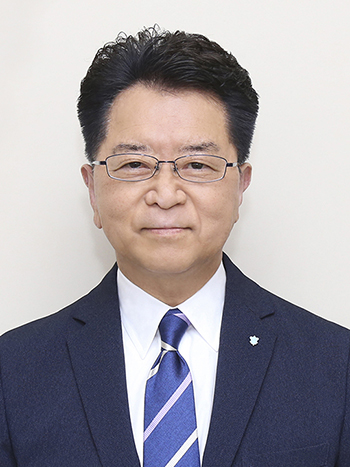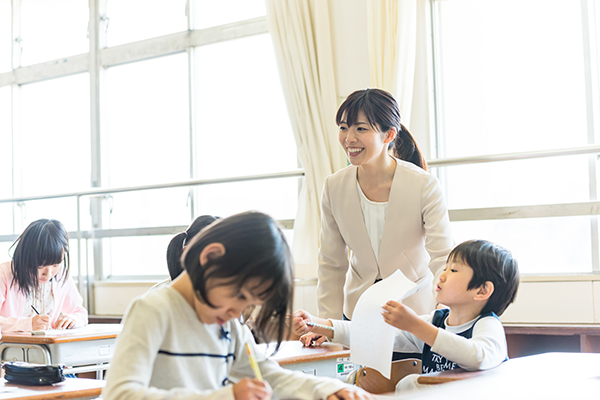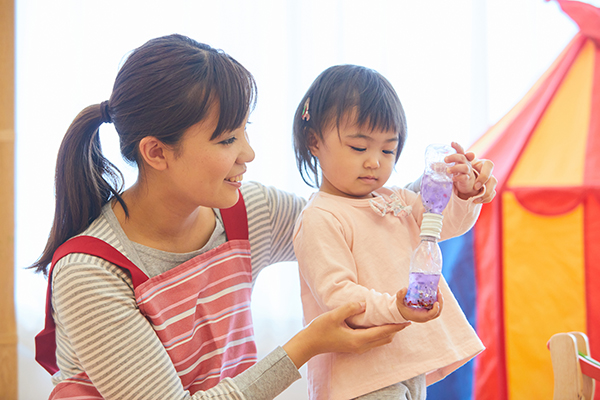Established in April 2023
School Education Course/Early Childhood Education Course
Childcare and education during infancy and childhood have significant roles in formation of in children. Our students examine optimal teaching methods through interaction with children. This department fosters child carers and educators who can deeply understand the psychology of children as they grow and interact with children from their perspective.
Our Philosophy/Policy
Education and Research Purpose
We aim to foster human resources, based on the Christian doctrine of love, who have a strong interest in supporting children's growth, development and education, acquire knowledge and skills as professionals and are broadly educated and internationally-minded, being superior especially in psychology, languages and arts so that they can contribute widely to society.
Message from Department Chairperson
To those who aim to become specialists in education and childcare
The Department of Child Education (Department of Human Development) aims “to foster professionals who support children's personality formation and development.” Our students study pedagogy and childcare education as human sciences, acquire the knowledge and skills to support the development of children through practical training, obtain qualifications and become specialists who play active roles in various workplaces. It is our greatest wish that each student has a fulfilling student life in order to acquire the sense of mission and responsibility required of a professional and to become a person with high integrity and a strong sense of humanity.
I teach English to students who aim to become teachers at junior high school, elementary school, kindergarten and nursery school. I have seen students who were struggling with English proactively studying English in various ways and with a lot of effort and motivation once they became aware that they would be in a position to teach. I was also strongly impressed by the growth of students after they experienced the teaching practice. It was as if they became different people. I believe that the time they spent together with the children during the teaching practice allowed them to realize that teaching was precious and worthwhile work in which they could become involved with the lives of children at the very start of their development, and this in turn led to the personal development of the students themselves.
I went to the United States to study after working for a company. I had no interest in study at that point, but while working in society, I started to seriously consider of studying for the first time. Life sure is a series of unexpected events.
Study opens up a whole new world. Even if you teach children, you will notice that it is the children that are actually teaching you. You have a future ahead of you which is beyond imagination. Let's pursue studies that have great potential for your brightest future.

Points of learning
We foster educators who are proficient in teaching English to children.
Even if a student is not proficient in English, she can study English education for infants, children and students without concerns since we have specialists in the field of English.Our students participate in practical teaching at actual sites and study the development of children.
From the first year, our students repeatedly participate in "one-day observation practice" where they interact with children at actual sites and in the third year, they undertake several weeks of teaching practice.Our students aim to acquire a broad range of expertise and skills, and obtain certificates.
With the practical learning, our students can aim to become elementary school teachers, junior high school teachers (English), kindergarten teachers and nursery teachers who are able to think from the children’s perspective.
Introduction of Courses
School Education Course

Students aim to obtain a first-class elementary school teaching certificate and a first-class junior high school teaching certificate (English) and can become teachers who also meet the requirements under the subject-based teacher assignment system introduced by the Ministry of Education, Culture, Sports, Science and Technology. Students can study the latest technologies and acquire the instruction ability so that they can adapt to the “GIGA School Concept” using digital equipments. We foster those who acquire a broad vision and flexible mindset through volunteer activities, cross-cultural exchange, among others. and can contribute to an increasingly globalized society.
Early Childhood Education Course

Students can obtain a first-class kindergarten teaching certificate and the qualification of nursery teacher. With subjects such as developmental psychology and developmental disability theory, we foster child carers and educators who can nurture the development of children in their infancy in a multifaceted way. We provide opportunities for students to experience childcare at actual sites from the first year so that they can acquire practical abilities, and by linking their experiences with a childcare simulation in the university, they study instruction methods that are better suited to the actual sites.
Policy for admission of new students
(1)Students sought by the Department of Child Education
We seek students who have a strong interest in supporting children's growth, development and education and are highly motivated to study the theory and practice of childcare and education.
We seek students who have a deep interest in humanity and society, make sincere efforts to understand and support especially children with love and a spirit of dedication and are cooperative.
We seek students who aspire to become nursery teachers, kindergarten teachers, elementary school teachers and junior high school teachers (English).
(2)High school study requirements (learning goals in high school)
Knowledge and social common sense at the high-school graduate level
Communication skills in human relationships
Policy on organizing and implementing curricula
In order to achieve the Diploma Policy of the Department of Child Education, the curriculum for training nursery school teachers, kindergarten teachers, elementary school teachers, and junior high school teachers (English) is organized as follows.
Early Childhood Education Course
(1) Content
Specialized classes are provided to cultivate the knowledge and skills of professionals in order to obtain qualifications and licenses for nursery teacher and kindergarten teacher. Specialized classes include basic subjects for the department, basic subjects for teaching, teaching methods, practical and hands-on training, childcare subjects, and developmental subjects to deepen, apply, and develop the basic specialized content by the time of graduation. In addition to the above qualifications, students will be able to acquire qualifications as recreation instructors and certified picture book artists. At the same time, students will develop a wide range of knowledge, culture, and an international outlook through general education courses. Particular emphasis will be placed on English language skills and psychology for children's English education.
(2) Method
Students learn the necessary knowledge to obtain licenses and qualifications through lectures, exercises, and practical training, while relating them to the study of basic subjects. In particular, in the practical training courses, students will enhance their adaptability to the field and develop more practical skills through observation practice, pre- and post-teaching, and actual practical training. In addition, students will have opportunities to gain practical experience and actively study through overseas training and off-campus volunteer experiences.
(3) Evaluation
Comprehensive evaluation of students' knowledge and skill abilities in all subjects, including common undergraduate subjects and specialized subjects, which are learned appropriately based on the achievement objectives.
School Education Course
(1) Content
Specialized courses are offered to cultivate the knowledge and skills of professionals in order to qualify as elementary school teachers and junior high school teachers (English). Specialized subjects include basic subjects for the department, basic subjects for teaching, teaching methods, practical/practical subjects, subject-related subjects, and developmental subjects to deepen, apply, and develop the basic specialized content by the time of graduation. At the same time, the general education subjects cultivate a broad range of culture and knowledge, as well as an international outlook. Special emphasis is placed on psychology to cultivate knowledge and skills to deal with various problems of children and students. In addition, the curriculum emphasizes practical skills as a specialist in English education at elementary and junior high schools.
(2) Method
Students learn the knowledge necessary for obtaining teaching qualifications through lectures, exercises, and practical training, while relating them to the study of the basic subjects. In particular, in practical training courses, students will enhance their adaptability to the field and develop more practical skills through observation practice, pre-service and post-service guidance, and actual practical training. In addition, students will have opportunities to gain practical experience and actively study through overseas training and off-campus volunteer experiences.
(3) Evaluation
Comprehensive evaluation of students' knowledge and skill abilities in all subjects, including common undergraduate subjects and specialized subjects, which are learned appropriately based on the achievement objectives.
Policy on Graduation Approval and Degree Conferment
DP1: Specialized Knowledge and Skills
Students shall acquire a basic understanding of education in human sciences through the study of various specialized fields in education. (School Education Course)
- Basics of education in human sciences.
DP2: Specialized Knowledge and Skills
Students who aim to become elementary school teachers or junior high school teachers (English) shall acquire the knowledge and skills required to support the growth and development of children or students. They should possess a global perspective essential in modern society and have good English proficiency as professionals in education. (School Education Course)
- Knowledge and skills required to support the growth and development of children or students.
- Global perspective and English proficiency.
DP3: Generic Knowledge and Skills
Students shall acquire the communication skills required as members of society, as well as a sense of mission and responsibility required as professionals and have the ability to put them into practice. (School Education Course)
- Communication skills.
- Ability to put into practice based on a sense of mission and responsibility.
DP4: Attitude/Intentionality
Students shall have a great love for children and possess the spirit of humanism, which are qualifications required of educators, and be able to demonstrate these qualities. (School Education Course)
- Great love for children and the spirit of humanism.
- Comprehensive ability to utilize knowledge, skills, and attitudes.
DP5: Specialized Knowledge and Skills
Students shall acquire the basics of childcare and early childhood education in human sciences through the study of specialized fields in childcare and early childhood education. (Early Childhood Education Course)
- Basics of childcare and early childhood education in human sciences.
DP6: Specialized Knowledge and Skills
Students who aim to become nursery teachers or kindergarten teachers shall acquire the knowledge and skills required to support children's growth and development. Additionally, they should have a global perspective and acquire English proficiency for engaging in early childhood English education. (Early Childhood Education Course)
- Knowledge and skills required to support children's growth and development.
- Global perspective and English proficiency.
DP7: Generic Knowledge and Skills
Students shall acquire the communication skills required as members of society, as well as a sense of mission and responsibility required as professionals and have the ability to put them into practice. (Early Childhood Education Course)
- Communication skills.
- Ability to put into practice based on a sense of mission and responsibility.
DP8: Attitude/Intentionality
Students shall have a great love for children and possess the spirit of humanism, which are qualifications required of child carers or early childhood educators and be able to demonstrate these qualities. (Early Childhood Education Course)
- Great love for children and the spirit of humanism.
- Comprehensive ability to utilize knowledge, skills, and attitudes.


